The interviewers ask one or two excellent questions, but the end result is a strange fudging of the issues. Spot the fallacies and misconceptions in the following dialogue. [We list the ones we spotted at the end of the transcript.] -vreaa
From Is Canada’s Housing Party Over? [28 Oct 2010 5:10 PM] BNN.ca [linked here at msn.com] –
Interviewer 1: Last week the Bank of Canada said there was a prospect of a more pronounced correction in the housing market and this week The Economist magazine’s latest survey claims that Canadian Real Estate is overvalued by something like 24%.
So, is the Canadian Housing Party finally over?
Here to give us some perspective is Don Campbell, he is president of the Real Estate Investment Network.
Well let’s start with that right away is the bubble over here in Canada, is this the end?
Don Campbell: It’s that magic word bubble, right? You can feel it doing THIS…
…with that word… There isn’t a bubble in Canada… let’s get really clear, there is no national real estate market… it’s very regional… and you’re going to see cities like Hamilton and cities like Edmonton and cities like Maple Ridge BC do incredibly well, for the next, you know, three to five years… and other areas, that are going to be overpriced, like the Vancouver market is overpriced… and will have a tendency to be flat.
And, when they talk about this bubble in their analysis, what it is really, is a big pendulum, and a pendulum has swung so far into the buyers market right now, that you are going to see that the economic fundamentals are going to sit… and they’re going to have to grow to support that… where the pendulum is sitting… And that pendulum will swing down… let’s be very clear. [Let’s try, to be clear, yes, please, very clear. Please. -ed.]
Interviewer 1: What the government, what the BOC keeps saying, and I think they have a valid point, is that the debt people are taking on to buy their houses is really getting out of control… The house prices are running way ahead of income levels… Isn’t that going to be a problem? isn’t that really the bubble that they may be more worried about… the debt bubble.. as opposed to the housing price bubble?
DC: They are, until you look at the housing affordability index… You know the RBC puts out a housing affordability index every quarter… And I keep seeing that it’s less affordable to buy, until you look at a ten year average of our affordability issue… hugely out of whack in Vancouver… slightly out of whack in Toronto… but every city across the country, housing affordability is trading right on ten year average… it’s very interesting.
Interviewer 2: So you don’t see if interest rates start to rise that there is going to be a significant amount of people that are going to be underwater here?
DC: No, I don’t see that at all, because I’m seeing that… Interest rates are going to go up, they’re not going to go up right away, because of everything else that’s going on in the world… but you’re going to see it tick up slowly… a lot of people are still in variable rate mortgages which is a great thing to be by the way… you can win, in that game… but right now, because of that trading range, because of the ten year trading range, I’m not seeing a big bubble anywhere, except maybe in the condo market in downtown Toronto and for sure in Vancouver.
—-
DC: [Discussing CREA changes] As the listings are growing across the country, therefore softening the price increases, these changes, come the spring, probably Jan Feb 2011, you’re going to see the listings start to escalate, over and above what would normally happen, therefore keeping a cap on prices, and therefore keeping it in that ‘buyers market’ arena… Now it’s funny, a lot of people…during that ‘seller’s market’, it was frothing, people going “I just can’t find a property to buy… I can’t”, now you have that exact market you’re looking for is the property you want to buy, and there’s lots of them, and everybody’s going… “Oh my goodness, I wish it was like the olden days, when it was all full, and prices were going up fast fast fast…”
Interviewer 2: I just question that because, having spent two years looking for a house in Toronto, the product though, isn’t great, so it seems to me that if you get a good product you’re still going to have that kind of froth there.
DC: Absolutely, and …
Interviewer 2: I guess people are putting junk out all the time…
DC: Constantly… You’re going to see a lot more junk come on …
Interviewer 2: Is that going to keep prices down, because it’s still (junk)…?
DC: It’s going to keep prices down, especially in that mid-range, the lower range will always sell, because it’s inexpensive, and you look at rent… you might as well buy, in that lower range. The luxury market is actually doing very well as well… It’s that middle market… in Vancouver and Toronto, and even in Montreal, is going to be the one that’s going to be expanding in the number of listings… There’s going to be some GREAT product that comes on board during that period of time…
———
Interviewer 2: Okay, if we look at potentially what kind of retracing we may be seeing here, let’s take Vancouver which you’ve mentioned several times, we saw sales plummet there in the summer by, I think, 45%, what kind of impact do you think that this could all have on prices in Vancouver?
DC: Well, one thing I think we have to be very, very clear of is average price is just an indicator that doesn’t mean ANYTHING, really, at the end of the day, because those condo, like you said, in certain areas, are continuing to go up while others are going down. You’re going to see the ground oriented units in Vancouver, that prices are going to plateau, which means houses and townhouses… anything with dirt involved in them… because they’re just getting unaffordable… and we’re moving to the boxes in the sky… What you’re going to see is that because of the HST, a lot more sales of the RESALES side of it… and um in the resale side, right now, there are a lot of brand spanking new condos, probably like we’re seeing here in Toronto, … a lot of people bought those properties, they’ve now bought it, paid the HST, and nobodies lived in it, and they’re going to sell it into the market place so there’s going to be a lot of brand new condos coming onto the market which you’re not going to have to pay HST on and that’s where the gold is going to be.
Interviewer 1: So where’s the market headed five years from now?
DC: If we take a national average, it gives a 3-5% average, you’re going to see 2011… not a very good year… but 2012, 2013, 2014, all of our economic analysis is showing that you’re going to see a 3-5% increase which, if you put 25% down on a property… it means you’re getting 20% return on your money… that’s a pretty good place to be…
Interviewer 2: Okay, so none of this/… we’re not looking at anything apocalyptic here, none of these declines of 10% that some of the banks are predicting for example?…
Interviewer 1: 25% though (laughs)…
DC: … The Economist magazine puts that out every month, right, that rating… The apocalypse is not coming…. I think you have to buy regionally… the number one fundamental that you have to look at if you’re buying an investment property is buy where there’s jobs… don’t buy where the jobs used to be, buy where the jobs are going to be.
You can not analyze a housing market by looking at the housing numbers, you can only analyze the future of the housing market looking at the economic fundamentals, which is jobs and in-migration.
———————
Fallacies and misconceptions in the above dialogue:
1. That “there isn’t a bubble in Canada”.
2. That areas that are overpriced will “be flat”; will “plateau”.
3. That we are in a “buyer’s market right now”.
4. That housing affordability at ten year average is reason for complacency. [hint: emergency low rates]
5. That there is no risk of “a significant amount of people that are going to be underwater here”.
6. That certain areas (Hamilton; Edmonton; Maple Ridge) and certain property types (the very low end; luxury) are immune from price drops, in fact will do “incredibly well”.
7. That there are going to be some GREAT opportunities in the spring [2011]… Including the ‘middle [mid-range] market’ in Vancouver; and the new resale [flip] condos where HST has been paid (“that’s where the gold is going to be”).
8. That “average prices don’t mean ANYTHING, really.”
9. That anybody knows what’s going to happen in the economy 2 years from now: “2012, 2013, 2014, all of our economic analysis is showing that you’re going to see a 3-5% increase.”
10. That leverage is to be embraced: “You’re going to see a 3-5% increase which, if you put 25% down on a property… it means you’re getting 20% return on your money.”
11. That a decline of 10% could be conceived to be ‘apocalyptic’. (“We’re not looking at anything apocalyptic here, none of these declines of 10% that some of the banks are predicting for example?”)
12. That the thought of a 25% price drop is laughable: “25% though (laughs)…”
13. That “you cannot analyze a housing market by looking at the housing numbers, you can only analyze the future of the housing market looking at the economic fundamentals, which is jobs and in-migration.”
14. That the possibility of a bubble existing is to be made light of.
15. That “the apocalypse is not coming.”
-vreaa









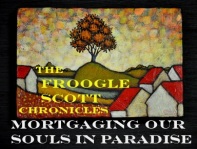




















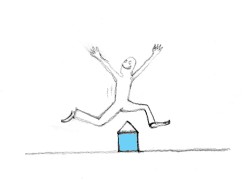

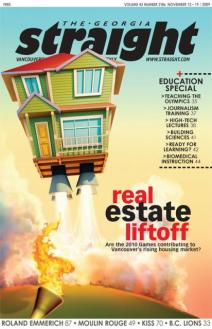




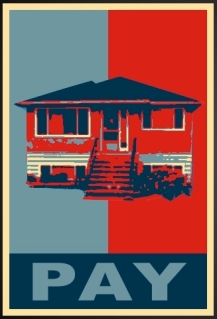
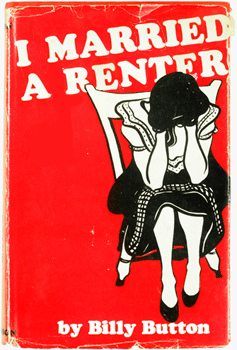
I am completely disgusted by sales people. This guy stinks of used car salesman. The fact that BNN would bring in someone espousing this rubbish is beyond comical… in fact, it is tragic. Markets rarely stay flat. There will be swings, up or down. I am willing to bet down!
10. That leverage is to be embraced: “You’re going to see a 3-5% increase which, if you put 25% down on a property… it means you’re getting 20% return on your money.”
Ummm… what about the interest on the mortgage????
$500,000 house
25% down = $125,000 // $375,000 mortage
4% price increase for 5 years = $608,000 (+$108,000)
mortgage interest for 5 years (@4%/25-yr) = (-$69,800)
Net gain = $38,200 = 30.56% in 5 years = 5.4% ROI per year *** BEFORE ANY COSTS ARE FACTORED IN.
So, once you include realtor fees, land transfer taxes, property taxes, etc., the return is basically zero.
I guess they don’t require you to know math when they bring you on BNN to be the “expert”.
I suspect that Don Campbell would reply “What about the rent?” and suggest that one should only buy properties where rent covers carrying expenses. [Possibly still feasible in some parts of the country at record low interest rates; in BC, hahaha, good luck.]
Ah you assume a 4% mortgage? Well you need to go back to the Don Campbell school of accounting and investment. Get a 2.5% variable, extend it for the life of the mortgage (35 years) and 20% ROI is conservative. No Realtor fees because you buy and sell direct to someone in REIN.
Great pics. Poor Don can’t catch a break around here.
Example
Purchase Price: $240,000
25% Down: $60,000
Mortgage: $180,000 (35 yrs amortization, 6% i)
Conservative Growth Rate 3%
$150/ month cash flow
AFTER YEAR 1
growth rate: 3%
mortgage balance: $178,415.32
Net Cash Flow: $1,800
Property Value: $247,200
Year End Equity: $10,584.68
ROI/year: $17.6% (=(10,584.68*100)/60,000)
Maybe way too complicated for some people 😉
You CAN buy good cash flowing properties in BC, just stop going where everybody is going!
I just bought a half duplex in Fort St. John for $230,000, monthly rent is $1750 , monthly cash flow is $700
Average income for gas workers: $100,000/year
Petro China paid $5.4 billion in BC natural gas investment with Encana,
Sasol paid Talisman Energy’s gas holdings $2 billion.
BUT I GUESS IS EASIER TO HIDE BEHIND THE SCREEN AND DO NOTHING
We love how, for Nayeli, doing ANYTHING other than buying RE equates to doing ‘nothing’.
Nobody even asked him about cap-rates when he started babbling about “fundamentals” and swinging “pendulums”…..they were content treating him like the retarded child that he is, obviously.
Soft landings don’t exist. If prices plateau and cash flows stay negative, it will not make any sense for investors to hold their properties and keep paying their mortgages. At some point, once they realize that the market has reached a “plateau”, they will rush for exists and cause a crash.
The market has only two options – UP or DOWN. No plateau.
“The apocalypse is not coming”
Oooh… I do love those quotes for the ages.
Don Campbell – “President of the real estate investment network.” I checked their website and they claim to be an unbiased research network.
Hmmm… sounds to me like he only makes money if there’s liquidity and buyers. Thus, he’s programmed to say that the market is strong and is getting stronger. Instead, he dances around and suggests that there could be strength in spots. He was clearly on the defensive throughout the entire interview and kept repeating things.
From this interview, his strategy is to play on an investment rotation. This is like in the stock market when people refer to a sector rotation. “Everyone is moving out of semiconductors and going to biotech stocks.” There isn’t really such a thing in RE, so he has to create it, break up the market and defer to localization and class:
* “don’t want to invest in Vancouver? no problem. come to Maple Ridge, Kelowna, whatever.”
* “Invest in the high end or the low end… just not in the middle”
Actually, I stand corrected. There is a thing such as real estate sector rotation… though, it’s not really a rotation, more of a diversification strategy. Investors can look to properties in China, Canada, Australia, US, etc. His biggest fallicy is that he reveals his bias by suggesting that prices can’t fall. *Of course* they can fall, and BNN viewers aren’t idiots. They see stock prices fall all of the time.
Update on a rental property I posted some time ago on this blog. Rents are decreasing as well…
I have been following this 1BR 630 sq.ft. condo in the Olympic village. It has been for rent since at least early August 2 for $1750! (I even sent them an email early September to tell them that there was no way they were going to find a fool that would pay $1750 per month for that). After sitting empty for 3 months, they finally followed my advice and decreased their price to $1,650 which is still very expensive considering the size, location and bad publicity around the OV…
I’m wondering how long it will take them to find a tenant and how much it will have cost them to wait with their overpriced condo sitting empty…
Here is the link: http://vancouver.en.craigslist.ca/van/apa/2035326065.html
Pingback: Above Comment Headlined: “Update on a Olympic Village rental condo. Rents are decreasing.”
Real estate sector rotation. That’s a new one. Like rotating between precious metals, I assume? 😆
Yeah, a variant of the ‘4 blocks around my house is bullet-proof’ theme…
All boats drop when the tide goes out, even the best of them.
Pingback: Sex & Real Estate | Landlord Rescue
Pingback: If There Isn’t A Bubble, Why Are All These Public Figures Feeling Moved To Publicly Announce That There Isn’t A Bubble? | Vancouver Real Estate Anecdote Archive
How about this for a scenario (paraphrasing)?
you’re going to see a 10% decrease which, if you put 25% down on a property… it means you’re getting -40% return on your money… that’s a pretty bad place to be…